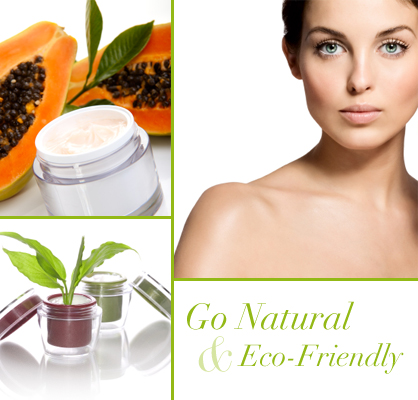Eco-Beauty: Experts weigh in on the importance of organic products
You may be well familiar with the arguments for eating organic, natural foods. But have you considered the importance of using organic, all-natural products in your cosmetics and skin care and hair care products? It may be more important to your health than you realize.
Arnoux Goran, founder of Total Health Mastery, makes a simple point. When you eat something, it goes into your digestive system, where your liver has a chance to cleanse it and remove a great deal of toxins before they enter the bloodstream and your tissues. When you put synthetic products directly on the skin, the chemicals go straight into your tissues and can be more harmful than ingesting. These toxic chemicals can build up in your body, potentially leading to cancer and other conditions.
“It is crucial to avoid anything toxic be put on any part of your skin, whether it’s your scalp or hands or face,” Goran, MNLP, MHt, MTD, said.
Joshua Onysko, CEO of Pangea Organics, a line of organic body care, agrees. The skin, he says, absorbs up to 80 percent of what you put on it. Pair this with the fact the average woman applies more than 70 known carcinogens each day through the use of cosmetics, creating a potential sticky situation.
The experts interviewed seem to agree on what chemicals to avoid: all.
“Anything unnatural, the body doesn’t understand what it is and usually treats it as a toxin or it is a toxin, and we know that toxins cause all kinds of problems,” Goran said.
Peggy Sue Grey, whose Eco Elegance Salon in Laguna Beach, Calif., uses all-natural, all-organic products, believes that you can still be beautiful and be good to yourself and to the environment at the same time.
“I know the ingredients, and I’ve been following the outcomes and it’s very dangerous stuff. You don’t really need that to look beautiful,” Grey said, expressing concern that cosmetic products and ingredients are not subject to FDA premarket approval authority (with the exception of color additives).
Grey urges clients to do their own research: Pick up their cosmetics, Google the ingredients, and learn the dangers – before they start facing the consequences. She advises looking for the labels “vegan” or “organic.”
Many ingredients of personal care products are from waste materials formed by processing crude oil into gasoline, Goran said. His advice on checking labels includes scanning for items made from these byproducts by looking for “–ol” at end of the ingredient.
In taking stock of the toxicity of the products you use, Onysko recommends a basic principle: Throw out everything that has an ingredient you wouldn’t eat.
Goran believes that good skin and hair come from having a clean body on the inside, and not from chemicals applied externally.
“If your body is clean on the inside, your body looks amazing on the outside,” Goran said. “If your body is dirty on the inside … it is full of years of toxic build-up, then the skin becomes more and more damaged, and what we mistakenly do is to try to fix the skin by putting things on the outside.”
He reports, in his 10 years in the industry, working with people who have had severe acne, rosacea, cracking and bleeding skin, and other serious skin conditions, and he was able to clear their problems.
Some of the top benefits of natural and organic products, however, are not personal, but for the planet. “We’re really helping the environment,” Grey said. “(These chemicals are) not going into our landfills, it’s not down our drains, it’s not going out into the ocean, but most importantly, it’s not going into our bodies.”
Aveda, a line of professional plant-based products, recommends products that use 100 percent essential oil aromas (no synthetic fragrances) and contain naturally-derived ingredients.
“Aveda feels strongly that anything you put on/in your body should be safe enough to also be deposited into the Earth,” Shelley Bawiec, Aveda global director of spa sales and education, said. It makes sense: In the end, anything you do to your body, you do to the planet.
Onysko also points out that organic products are more biodegradable after use, in addition to the environmental impact of millions of pounds of synthetic fertilizers and herbicides used to grow nonorganic agricultural crops.
The advice is to replace everything in your bathroom with all-natural products: perfume, toothpaste, shampoo, soaps, etc.
Of course, the same philosophy applies to many other areas of your life. “Not even just the beauty field, I would get (all chemicals) out of your house,” Grey said.
All told, it comes back to fundamental economics. “We are all personally responsible for why our planet is the way it is,” Goran said, “and we can change that by changing how we take care of ourselves and by taking better care how we spend our money.”
For more information about these companies, visit their websites: www.ecoelegancesalon.com; thmastery.com; www.pangeaorganics.com/index; www.aveda.com.
Tagged in: beauty, skin, makeup, cosmetics, hair, products, organic, natural, total health mastery, aveda, chemical, eco elegance salon, pangea,

PurpleNeon/LadyLUX



